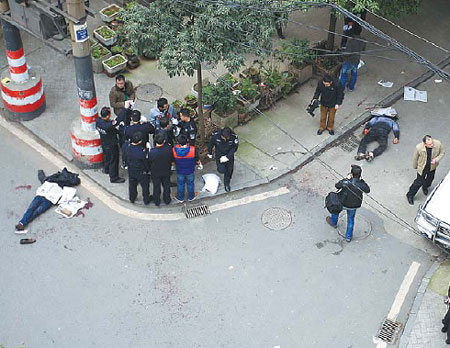 Chinese artists from Flight MH370 and their art
Chinese artists from Flight MH370 and their art
 Top 30 entrepreneurs under 30 in China
Top 30 entrepreneurs under 30 in China
 800-year-old ancient village in Shanxi
800-year-old ancient village in Shanxi
 World's top 10 most prestigious institutions
World's top 10 most prestigious institutions
 Chinese airborne troops conduct low altitude flight training
Chinese airborne troops conduct low altitude flight training
 Beautiful fisherwomen in SE China
Beautiful fisherwomen in SE China
 1,500-year-old coffin excavated from grassland in N China
1,500-year-old coffin excavated from grassland in N China
 See what Google glass captures at 'two sessions'
See what Google glass captures at 'two sessions'
 In pictures: beautiful women in different ages
In pictures: beautiful women in different ages
 |
| The scene of a knife attack in Changsha, Hunan province. Six people died in the incident. Provided to China Daily |
Rising concerns
Awareness of terrorism and personal safety should be regular parts of the curriculum, according to Gui, who added that the program will provide details of how to best maintain public security, but would not point fingers at any particular group in society. "The purpose is to help students gain a better understanding of anti-terrorism work, not to aggravate conflicts," he said.
Given that concerns about further attacks have surfaced nationwide, that may be easier said than done. Even as people were digesting the news of the Kunming atrocity, news broke of another knife attack, this time in Changsha in the central province of Hunan. A dispute between two market stallholders developed into a fight in which one of the vendors killed the other. The murderer then attacked and killed four innocent bystanders, before he was shot dead by the police. Although the local authorities stressed that the incident was not linked to terrorism, the fact that the protagonists were both members of the Uygur ethnic group, like the perpetrators of the Kunming attack, triggered disquiet and concerns about public safety.
On March 14, unfounded rumors of a knife attack in Chengdu, the capital of Sichuan province, resulted in chaotic scenes in the city's downtown area. The following day, in an attempt to distract pursuers, a pickpocket in a shopping mall in Guangzhou, Guangdong province, shouted out that a knife attack was under way, resulting in confusion and fears of a repeat of the Kunming attack.
"In the past, terrorism as a concept was far from familiar in China, but now it has come and it's time to take action," said Zhao Guangwu, director of the School Security Office at Yunnan Education Department.
Anti-terrorism and personal safety education in schools will be promoted by the authorities from the provincial to the local level in the coming months, he said. Meanwhile, a campaign to promote an educational program for primary and secondary school students has been launched in a number of cities and provinces, including Zhejiang, Guangxi and Guangdong.
Many of the schools have chosen to use role-playing as a means of driving the message home and helping the children to remember fundamental safety procedures. At Dongxin Kindergarten in Hangzhou, the capital of Zhejiang, for example, security guards pretended to be terrorists intent on kidnapping a child, while the teachers called the police, mobilized the students and led them to "safety".
At the end of the month, Chengdu will promote a terrorism awareness program in every kindergarten and primary and secondary school in the city, according to a report in the Chengdu Business Daily. Two e-books - Details of Self-protection in a Terrorist Attack and Survival Skills in a Terrorist Attack - have already been uploaded onto a website for the city's students, who have to key in their personal identification code to access the material.


 Female journalists at 'two sessions'
Female journalists at 'two sessions' Interpreters serving 'two sessions'
Interpreters serving 'two sessions' Female SWAT team in Chongqing
Female SWAT team in Chongqing Top 10 safest airlines in the world
Top 10 safest airlines in the world Old photos of Anti-Japanese War
Old photos of Anti-Japanese War Mysterious 'Dolan Tribe' in Xinjiang
Mysterious 'Dolan Tribe' in Xinjiang A bite of Luoping County
A bite of Luoping County This is Shanghai
This is Shanghai Chinese airborne troops complete parachute training in various training bases
Chinese airborne troops complete parachute training in various training bases Ballerinas anywhere but onstage
Ballerinas anywhere but onstage Most unusual taxis around the world
Most unusual taxis around the world Micro-expression at 'two sessions'
Micro-expression at 'two sessions' Bridge Worship Festival in Taijiang, SW China
Bridge Worship Festival in Taijiang, SW China Hollywood documentary brings Diaoyu Islands truth to new audience
Hollywood documentary brings Diaoyu Islands truth to new audience Miss HK and actresses shine at flower show
Miss HK and actresses shine at flower showDay|Week|Month